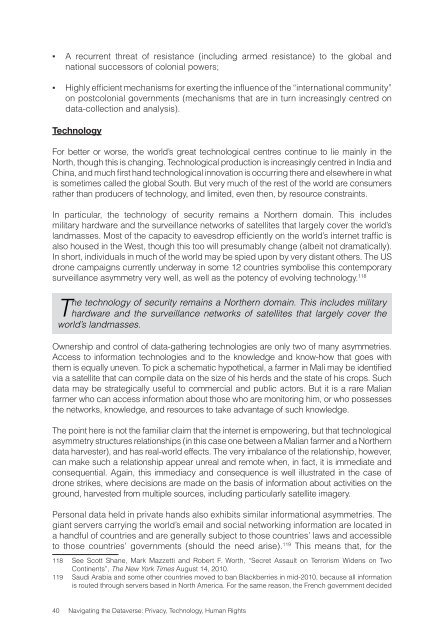Navigating the Dataverse: Privacy, Technology ... - The ICHRP
Navigating the Dataverse: Privacy, Technology ... - The ICHRP
Navigating the Dataverse: Privacy, Technology ... - The ICHRP
You also want an ePaper? Increase the reach of your titles
YUMPU automatically turns print PDFs into web optimized ePapers that Google loves.
▪<br />
▪<br />
A recurrent threat of resistance (including armed resistance) to <strong>the</strong> global and<br />
national successors of colonial powers;<br />
Highly efficient mechanisms for exerting <strong>the</strong> influence of <strong>the</strong> “international community”<br />
on postcolonial governments (mechanisms that are in turn increasingly centred on<br />
data-collection and analysis).<br />
<strong>Technology</strong><br />
For better or worse, <strong>the</strong> world’s great technological centres continue to lie mainly in <strong>the</strong><br />
North, though this is changing. Technological production is increasingly centred in India and<br />
China, and much first hand technological innovation is occurring <strong>the</strong>re and elsewhere in what<br />
is sometimes called <strong>the</strong> global South. But very much of <strong>the</strong> rest of <strong>the</strong> world are consumers<br />
ra<strong>the</strong>r than producers of technology, and limited, even <strong>the</strong>n, by resource constraints.<br />
In particular, <strong>the</strong> technology of security remains a Nor<strong>the</strong>rn domain. This includes<br />
military hardware and <strong>the</strong> surveillance networks of satellites that largely cover <strong>the</strong> world’s<br />
landmasses. Most of <strong>the</strong> capacity to eavesdrop efficiently on <strong>the</strong> world’s internet traffic is<br />
also housed in <strong>the</strong> West, though this too will presumably change (albeit not dramatically).<br />
In short, individuals in much of <strong>the</strong> world may be spied upon by very distant o<strong>the</strong>rs. <strong>The</strong> US<br />
drone campaigns currently underway in some 12 countries symbolise this contemporary<br />
surveillance asymmetry very well, as well as <strong>the</strong> potency of evolving technology. 118<br />
<strong>The</strong> technology of security remains a Nor<strong>the</strong>rn domain. This includes military<br />
hardware and <strong>the</strong> surveillance networks of satellites that largely cover <strong>the</strong><br />
world’s landmasses.<br />
Ownership and control of data-ga<strong>the</strong>ring technologies are only two of many asymmetries.<br />
Access to information technologies and to <strong>the</strong> knowledge and know-how that goes with<br />
<strong>the</strong>m is equally uneven. To pick a schematic hypo<strong>the</strong>tical, a farmer in Mali may be identified<br />
via a satellite that can compile data on <strong>the</strong> size of his herds and <strong>the</strong> state of his crops. Such<br />
data may be strategically useful to commercial and public actors. But it is a rare Malian<br />
farmer who can access information about those who are monitoring him, or who possesses<br />
<strong>the</strong> networks, knowledge, and resources to take advantage of such knowledge.<br />
<strong>The</strong> point here is not <strong>the</strong> familiar claim that <strong>the</strong> internet is empowering, but that technological<br />
asymmetry structures relationships (in this case one between a Malian farmer and a Nor<strong>the</strong>rn<br />
data harvester), and has real-world effects. <strong>The</strong> very imbalance of <strong>the</strong> relationship, however,<br />
can make such a relationship appear unreal and remote when, in fact, it is immediate and<br />
consequential. Again, this immediacy and consequence is well illustrated in <strong>the</strong> case of<br />
drone strikes, where decisions are made on <strong>the</strong> basis of information about activities on <strong>the</strong><br />
ground, harvested from multiple sources, including particularly satellite imagery.<br />
Personal data held in private hands also exhibits similar informational asymmetries. <strong>The</strong><br />
giant servers carrying <strong>the</strong> world’s email and social networking information are located in<br />
a handful of countries and are generally subject to those countries’ laws and accessible<br />
to those countries’ governments (should <strong>the</strong> need arise). 119 This means that, for <strong>the</strong><br />
118 See Scott Shane, Mark Mazzetti and Robert F. Worth, “Secret Assault on Terrorism Widens on Two<br />
Continents”, <strong>The</strong> New York Times August 14, 2010.<br />
119 Saudi Arabia and some o<strong>the</strong>r countries moved to ban Blackberries in mid-2010, because all information<br />
is routed through servers based in North America. For <strong>the</strong> same reason, <strong>the</strong> French government decided<br />
40 <strong>Navigating</strong> <strong>the</strong> <strong>Dataverse</strong>: <strong>Privacy</strong>, <strong>Technology</strong>, Human Rights
















